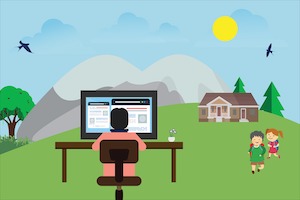
In the past two decades, companies with predominantly remote workforces have been created and risen to dominance. Meanwhile, many traditional companies have also loosened the reigns on office jobs, extending flexible work arrangements as appropriate. Office work is undergoing a sea change and it’s not even close to complete.
Despite this, many businesses are still reluctant to fully embrace remote working. Among the most hesitant are those who view it as a fad instigated by technology but not proven in terms of productivity - something that happens because it can, not because it should. But the rise of remote working has little to do with technology itself. And the trend will only accelerate because society and business itself is changing.
Infrastructure, Dual-Income Households, Personal Health, oh my…
Nearly a century into America’s suburban experiment, it’s clear something has gone awry.
Public transit options are not great, critical infrastructure is crumbling, automobile traffic gets worse every year, and even parking a car can be a challenge. The length of the average employee’s commute continues to tick up.
We also now must acknowledge the impact our choices have on the climate. Carbon reduction efforts are already in full-swing and will only continue to increase exponentially as climate change stays top-of-mind. This won’t simply be a matter of upgrading the cars, infrastructure, and products we already have. It will mean full-on behavioral changes… like avoiding unnecessary commutes and consumption altogether.
But perhaps most compelling is that the fabric of society has changed. Most households are dual-income, and many of those households have children living in them. Meanwhile, there is increasing focus on mental and physical health. So what we often find is two parents both working a job, maintaining a house, taking care of their children, taking care of themselves, and trying to do all of it in a way is health-conscious.
“… as newer generations rise in the workforce, many are refusing to make the false choice between being successful at work and fostering a healthy and happy family. They understand that long daily commutes should be relegated to the past.”
So as newer generations rise in the workforce, many are refusing to make the false choice between being successful at work and fostering a healthy and happy family. They understand that long daily commutes should be relegated to the past. They need more flexibility in where they physically work so that minor but frequent scheduling challenges at home don’t have to translate into big disruptions at work. It’s not only what’s best for them, but also their employers.
Diversity and Presence
It’s no secret that we’re now living in the Information Age. But in a world that is changing more rapidly than ever, it’s about way more than just passing information back and forth. It’s about connecting dots and solving complex problems. And for that, businesses find themselves needing socially and professionally diverse employees - ones who can offer rich perspectives and skillsets spanning way beyond traditional education and job histories. This means that the most promising job candidates are likely not coming from traditional 9-5 office jobs. And they’re usually not interested in changing that reality.
“We’re also always on … [And] if the expectation is that work objectives must be accomplished regardless of when or where the work takes place, then it is counterintuitive - and dare I say disrespectful and dangerous - to simultaneously use an office as a time and space boundary from 9-5.”
We’re also always on. With technology making everybody more accessible and able to get a job done regardless of location, we find there is less space between our personal and professional worlds. Many employers embrace this reality because it means their employees are able to make a greater impact. But when employees flex to work remotely during their personal time, the expectation quickly becomes that employers can flex a bit during work time. And this is where the floodgates really open. Because if the expectation is that work objectives must be accomplished regardless of when or where the work takes place, then it is counterintuitive - and dare I say disrespectful and dangerous - to simultaneously use an office as a time and space boundary from 9-5.
Technological leaps
Of course, technology is playing a big role in all of this. And it’s getting better every year. It’s difficult to remember, but less than two decades ago, professional chat, screen sharing, and video conferencing tools didn’t exist as anything more than novelties. Now they are all mature and commonplace. But make no mistake. This is not the best remote working technology will get. Each generation of improvements will inch us closer to a pervasive remote-first culture - one where we not only get our work done remotely, but interact with our coworkers as naturally in a remote fashion as we do in an office.
Are you ready for what’s to come?
Are you hanging on to the past or stepping in to the future? I believe that both companies and employees who embrace remote work wholeheartedly today will have a major leg-up tomorrow.